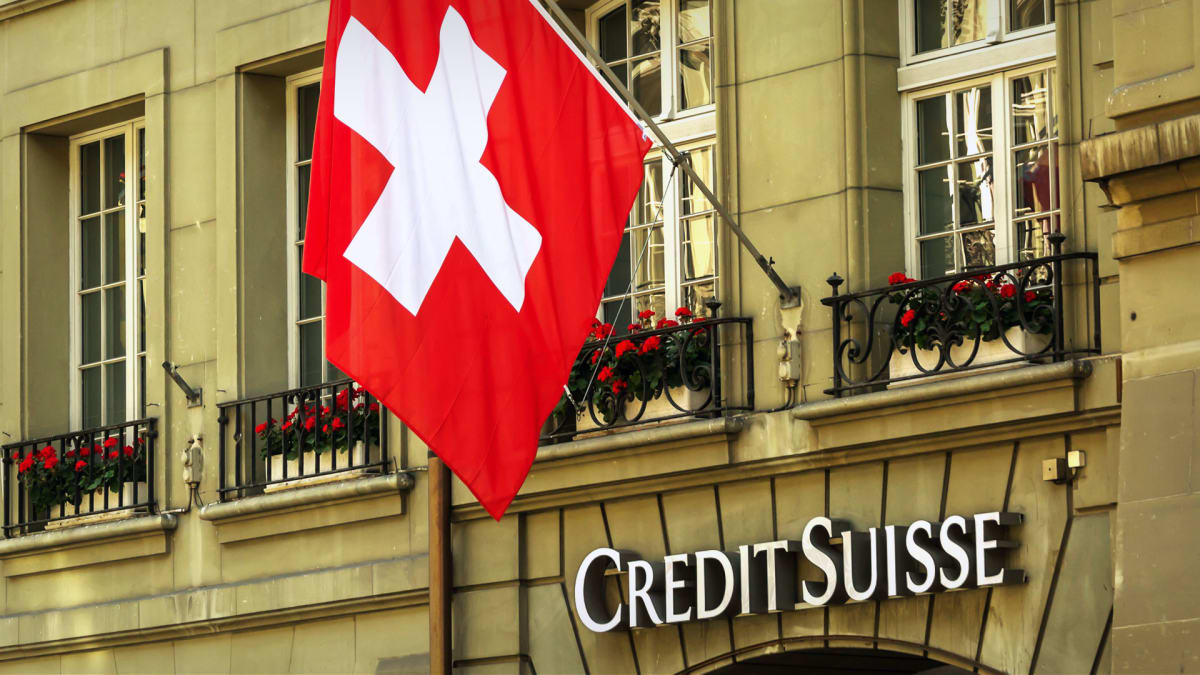
Swiss authorities waited for the closing of the European markets so as not to add panic to fear, as they tried Wednesday to reassure investors worried about the financial solidity of Credit Suisse (CSGKF) .
A flagship Swiss and European bank, the Credit Suisse experienced another horrible day on the stock market on March 15, as its stock fell more than 26% to close at an all-time low.
Credit Suisse's credit default swaps (CDS), a form of insurance for bondholders, hit new record highs. This means that investors holding the bank's debt have to pay a lot more to insure themselves in the event that Credit Suisse cannot repay them. When the cost of CDS rises sharply, it suggests that investors clearly doubt that the company will be able to honor its debts.
"Credit Suisse meets the capital and liquidity requirements imposed on systemically important banks," FINMA, the Swiss Financial Market Supervisory Authority, and The Swiss National Central Bank (SNB) said in a joint statement.
Backstop for Credit Suisse
To quell any skepticism, they added that the bank will receive a liquidity backstop if needed.
"If necessary, the SNB will provide CS with liquidity,' the two regulators said.
The new upsurge in concerns around Credit Suisse comes after the sudden collapse of Silicon Valley Bank (SIVB). The Santa Clara, Calif.-based bank played a central role in the startup ecosystem. Its interest rate bets went awry and the bank was unable to cope with massive customer withdrawals, forcing regulators to shut it down.
Swiss regulators say there are no similarities between Credit Suisse and SVB.
"The problems of certain banks in the USA do not pose a direct risk of contagion for the Swiss financial markets," FINMA and the SNB asserted. "The strict capital and liquidity requirements applicable to Swiss financial institutions ensure their stability."
"Systemically important banks have to meet higher capital and liquidity requirements. This allows negative effects of major crises and shocks to be absorbed."
The two regulators also said that they are following the developments "very closely."
You can read their statement here.
"We welcome the statement of support issued by the Swiss National Bank and the Swiss Financial Market Supervisory Authority FINMA," the bank reacted.
Earlier, Axel Lehman, chairman of Credit Suisse, had indicated that a government bailout was not the topic.
"We are regulated, we have strong capital ratios, very strong balance sheet. We are all hands on deck. So that’s not the topic whatsoever," Lehman said, insisting that the prospect of government aid is "not a topic whatsoever.”
A Turnaround Plan
The banker repeated that Credit Suisse had already taken "the medicine" to tackle its problems. Lehman referred to the emergency plan announced last October by Credit Suisse considered by many analysts and the markets as the last chance plan.
The plan focused on the asset management business. The firm wants to cut 9,000 jobs by 2025 in an effort to reduce its cost base by 14.5 billion Swiss francs in three years.
It is also planning to break up the investment bank into three parts. The investment bank was once the company's cash cow, but a series of scandals have cost Credit Suisse several billion dollars in losses and fines imposed by regulators.
The company is also selling a "significant portion" of its Securitized Products Group business.
In addition to fears of contagion, Credit Suisse is also suffering from the fact that its largest shareholder has indicated that it will no longer invest in the bank for regulatory reasons.
Saudi National Bank Chairman Ammar Al Khudairy was asked by Bloomberg TV on March 15 whether his company was open to further injections if there was another call for additional liquidity.
"The answer is absolutely not, for many reasons outside the simplest reason, which is regulatory and statutory," Al Khudairy said, definitively ruling out the possibility.
Saudi National Bank, which is 37% owned by the sovereign wealth fund of Saudi Arabia, became the first shareholder of Credit Suisse as part of a capital increase operation at the end of last year.
Greensill Capital Setback
Saudi National Bank had acquired 9.9% of the capital in exchange for an investment of 1.4 billion Swiss francs. But in just a few months, the value of this stake has already diminished by $500 million.
Credit Suisse has suffered setback after setback since March 2021 and the bankruptcy of Greensill Capital, a specialized lender with links to former U.K. Prime Minister David Cameron.
The British company, which was founded in 2011 by the financier Lex Greensill, was a supply chain and accounts receivables lender, that specializes in lending money to companies so that they can pay their suppliers. It then packaging the debts of these companies into financial securities, which it resold to investors.
The house of cards began to crumble when these investors, including Credit Suisse, had doubts about the real value of the debts and abandoned Greensill, which then filed for bankruptcy in March 2021.
Credit Suisse invested $10 billion of its clients' capital in Greensill products.







